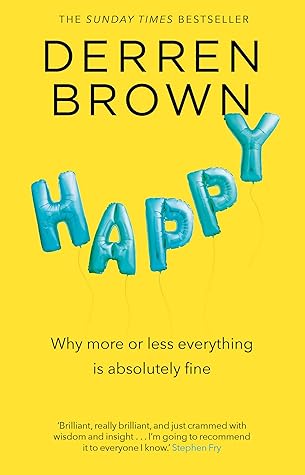More on this book
Community
Kindle Notes & Highlights
by
Derren Brown
Read between
June 26 - August 10, 2020
‘He is only a visitor who has managed to confuse his self with the world. He had assumed he was yet another stable object, like the city of Edinburgh or a tree or a book, whereas he is more like a shadow or a sound.’
I now regard a terminal illness as a weird kind of privilege. Unlike the swift, brutal finality of a heart attack or road traffic accident, I have been granted the honour to plan and prepare both myself, and my family, for what is to come.
So death, the most terrifying of ills, is nothing to us, since so long as we exist, death is not with us; but when death comes, then we do not exist. It does not concern either the living or the dead, since for the former it is not, and the latter are no more.
Something is only bad for you if you exist, he is implying, and when you are dead you don’t exist. Therefore death isn’t bad for you.
Death, we remember, does not round off a life with the satisfying ending of a novel or a film. It does not ‘complete’; it curtails. It is up to us to bring the story to a close by recognising it as such.
axis through life, shifting our expectations to work with reality, reminding ourselves that things may not work out as we expect, that we may lose the things we value, that things come and go: all this we know is to aim for a kind of tranquillity.
However, in the ontological mode (‘ontology’ is the study of what it is to be), we stand back and look at the marvellous fact that things, and we, exist. Our attention is turned from the physical trappings of daily life to the deeper questions of being, and in this mode we are more likely to make worthwhile changes in our life. This, indeed, is part of the ‘considered life’ this book is talking about. Without stepping into this ontological mode, it will be hard to make sense of anything here. Yalom talks about the importance of this viewpoint in relation to dealing with a fear of death:
You are prompted to grapple with your fundamental human responsibility to construct an authentic life of engagement, connectivity, meaning and self-fulfilment.
There are many ways to die, and plenty of them will deny any opportunity of self-discovery.
We might never rid ourselves of a lingering anxiety regarding our death; this is a kind of tax we pay in return for self-awareness. But, as with any fear that becomes inappropriately inflated, we can, like Debra and many others, learn to stare it in the face when it comes. With further thought, we might even elevate our lives by accommodating ourselves to it right now, before it threatens to become urgent and terrifying. Death, perhaps uniquely amongst the objects of our dread, instructs us how to live.
WE GENERALLY FEEL defined by our past. Our past, however, is a story that we tell ourselves in the present.
Cause I forgot you left me behind to remind me of you.
When someone dies, they leave a glowing corona behind them, an afterglow in the souls of those who were close to them. Inevitably, as time passes, the afterglow fades and finally goes out, but it takes many years for that to happen. When, eventually, all those close ones have died as well, then all the embers will have gone cool, and at that point, it’s ‘ashes to ashes and dust to dust’.1
us: ‘No man ever steps in the same river twice, for it’s not the same river and he’s not the same man.’1 Plato
To live without anxiety is to live without growth. We shouldn’t try to control what we cannot, and we must take responsibility for our feelings. But the reason for this is to walk out into the world with strength, not to hide from danger.
Disturbance, then, can be a signal that we are moving in the right direction: namely, out of our comfort zone.


